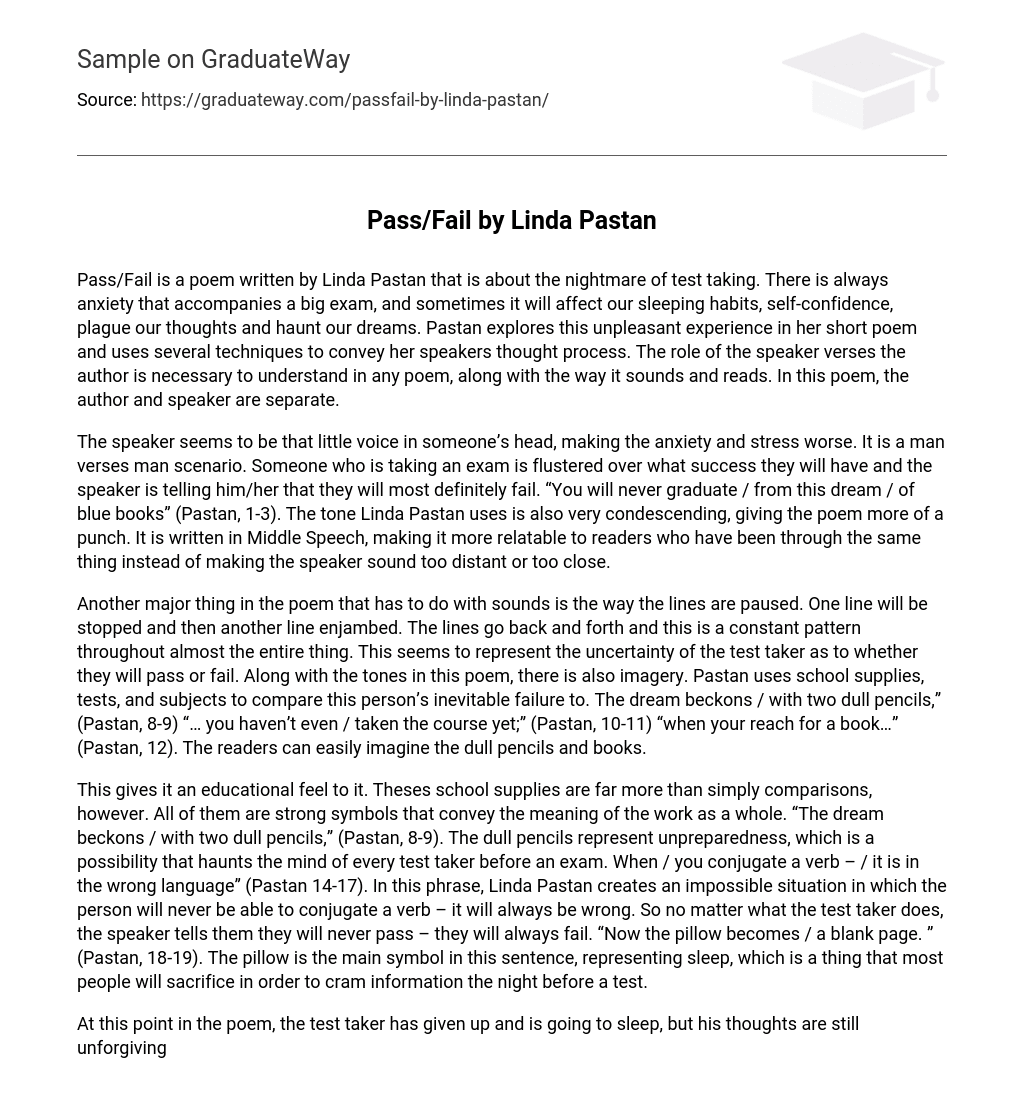Pass/Fail is a poem written by Linda Pastan that is about the nightmare of test taking. There is always anxiety that accompanies a big exam, and sometimes it will affect our sleeping habits, self-confidence, plague our thoughts and haunt our dreams. Pastan explores this unpleasant experience in her short poem and uses several techniques to convey her speakers thought process. The role of the speaker verses the author is necessary to understand in any poem, along with the way it sounds and reads. In this poem, the author and speaker are separate.
The speaker seems to be that little voice in someone’s head, making the anxiety and stress worse. It is a man verses man scenario. Someone who is taking an exam is flustered over what success they will have and the speaker is telling him/her that they will most definitely fail. “You will never graduate / from this dream / of blue books” (Pastan, 1-3). The tone Linda Pastan uses is also very condescending, giving the poem more of a punch. It is written in Middle Speech, making it more relatable to readers who have been through the same thing instead of making the speaker sound too distant or too close.
Another major thing in the poem that has to do with sounds is the way the lines are paused. One line will be stopped and then another line enjambed. The lines go back and forth and this is a constant pattern throughout almost the entire thing. This seems to represent the uncertainty of the test taker as to whether they will pass or fail. Along with the tones in this poem, there is also imagery. Pastan uses school supplies, tests, and subjects to compare this person’s inevitable failure to. The dream beckons / with two dull pencils,” (Pastan, 8-9) “… you haven’t even / taken the course yet;” (Pastan, 10-11) “when your reach for a book…” (Pastan, 12). The readers can easily imagine the dull pencils and books.
This gives it an educational feel to it. Theses school supplies are far more than simply comparisons, however. All of them are strong symbols that convey the meaning of the work as a whole. “The dream beckons / with two dull pencils,” (Pastan, 8-9). The dull pencils represent unpreparedness, which is a possibility that haunts the mind of every test taker before an exam. When / you conjugate a verb – / it is in the wrong language” (Pastan 14-17). In this phrase, Linda Pastan creates an impossible situation in which the person will never be able to conjugate a verb – it will always be wrong. So no matter what the test taker does, the speaker tells them they will never pass – they will always fail. “Now the pillow becomes / a blank page. ” (Pastan, 18-19). The pillow is the main symbol in this sentence, representing sleep, which is a thing that most people will sacrifice in order to cram information the night before a test.
At this point in the poem, the test taker has given up and is going to sleep, but his thoughts are still unforgiving and cruel. The pillow has become a blank page, signifying all the answers he will never know. “…smother / in all the feathers / that have to be learned / by heart” (Pastan, 21-24). The feather represents the material, the vocabulary, and the facts that the test taker has to memorize, to know “by heart”. All these symbols add to the theme and give more weight to the speaker’s insults.
Through these techniques, Linda Pastan illustrates the nightmares that go along with pre-testing stress and worry. Her poem also shows how when we worry about big exams, we often work against ourselves. If we don’t battle our own condemning thoughts then we won’t get far. This poem can go deeper than just “blue book” testing, however. Pastan’s Pass/Fail could also be compared to life tests and trials. In such a comparison, Linda Pastan shows us that we must battle ourselves if we want to pass, and if we don’t, then we will fail.





